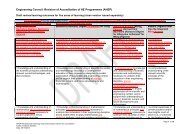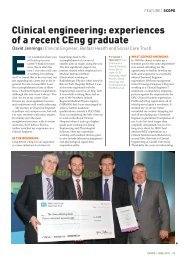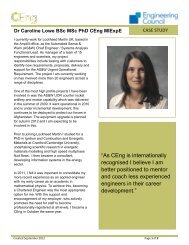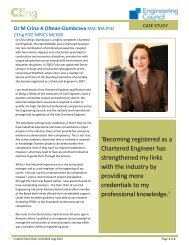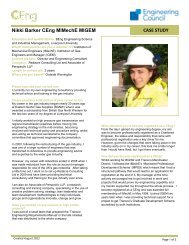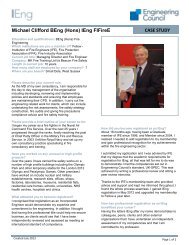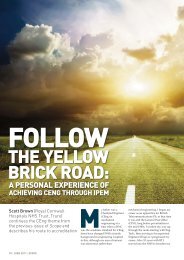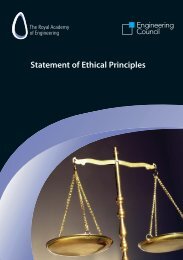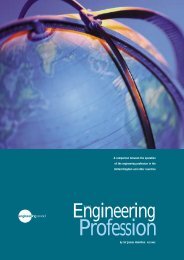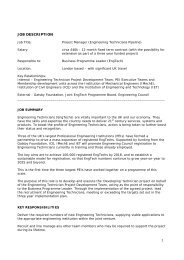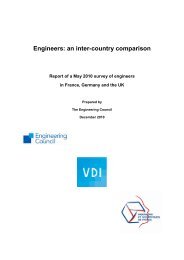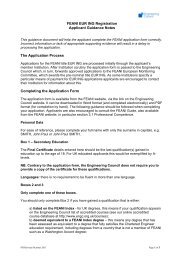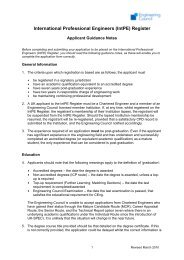An Engine for Change - A Chronicle of the Engineering Council
An Engine for Change - A Chronicle of the Engineering Council
An Engine for Change - A Chronicle of the Engineering Council
Create successful ePaper yourself
Turn your PDF publications into a flip-book with our unique Google optimized e-Paper software.
1996-1998: THE RUDGE YEARS 113EngC representatives also attended <strong>the</strong> Conservative and Liberal-Democrat annualconferences. It became EngC policy to provide a presence at <strong>the</strong> annual conferences <strong>of</strong> allmajor political parties.However, with hindsight it seems clear that much more advantage could have been taken <strong>of</strong><strong>the</strong> MOU, always assuming, in <strong>the</strong> light <strong>of</strong> <strong>the</strong> “New Relationship”, co-operation from <strong>the</strong>Institutions – maybe a big assumption in view <strong>of</strong> <strong>the</strong>ir desires to enjoy <strong>the</strong>ir own close contactwith Government Departments.Committee DevelopmentsSenate met five times during 1997 receiving reports from <strong>the</strong> BEP, <strong>the</strong> BER and <strong>the</strong>Executive Board. It approved <strong>the</strong> Memorandum <strong>of</strong> Understanding [<strong>An</strong>nex G] to which wehave just referred. The end <strong>of</strong> 1997 saw <strong>the</strong> retirement <strong>of</strong> 16 transition Senators, who hadbeen elected in 1995 to serve during <strong>the</strong> first two years <strong>of</strong> <strong>the</strong> new EngC. A fur<strong>the</strong>r 15transitional members, who had been elected in 1995 <strong>for</strong> 3 years, retired in 1998. TwoSenators, Sir Peter Williams and Sir Michael Lickiss, nominated by <strong>the</strong> Privy <strong>Council</strong> retiredfrom <strong>Council</strong>; <strong>the</strong> <strong>for</strong>mer was replaced by Dr Robert Hawley whom, in December 1998,Senate identified as Chairman from 1 January 1999 [see next chapter].The Post-Fairclough EngC’s second <strong>An</strong>nual Conference was held at <strong>the</strong> Institution <strong>of</strong> Civil<strong>Engine</strong>ers in November 1997. The opportunity was taken to introduce <strong>the</strong> EngC’s new award<strong>of</strong> a gold medal <strong>for</strong> “any individual, group or organization who, in <strong>the</strong> opinion <strong>of</strong> <strong>the</strong><strong>Engine</strong>ering <strong>Council</strong>, has made an outstanding contribution towards increasing <strong>the</strong> nationalstanding <strong>of</strong> engineers and <strong>the</strong> engineering pr<strong>of</strong>ession”. Known as “The Chairman’s Medal”,<strong>the</strong> first to be awarded were presented on 19 November 1997 by HRH The Duke <strong>of</strong> Kent tomembers <strong>of</strong> <strong>the</strong> team responsible <strong>for</strong> <strong>the</strong> Thrust supersonic car that had broken <strong>the</strong> land speedrecord. At <strong>the</strong> Conference <strong>the</strong> study groups from <strong>the</strong> 20/20 Vision joint programme alsoreported: Dr Malcolm Kennedy (Vice President <strong>of</strong> IEE) spoke on Communications, Dr TonyBarrell and Dr Mark Smith (IChemE) on Environment97 – an innovative cyber conferencepresentation. Follow up reports on energy and transport also were presented, by Mrs PamelaLiversidge (IMechE) on <strong>the</strong> <strong>for</strong>mer and again, as in 1996, by Tony Ridley (ICE) on <strong>the</strong> latter.The findings were distributed to key audiences including <strong>the</strong> Government.To provide a framework to engender a team spirit and cohesion <strong>for</strong> <strong>the</strong> EngC staff who wereattempting to cope with major internal organisational upheavals, Mike Heath, very soon afterhis appointment in 1995, built on his predecessor’s idea <strong>of</strong> <strong>the</strong> EngC aiming <strong>for</strong> <strong>the</strong> ‘Investorsin People’ award. As Diane Davy, Secretary <strong>of</strong> <strong>the</strong> Institute <strong>of</strong> Energy, wrote in an article in<strong>the</strong> Daily Telegraph on 16 July 1998: “One way to acknowledge [<strong>the</strong> value <strong>of</strong> staff] is bypublic recognition, such as comes from being an Investors in People organisation.” Toachieve this award its assessors have to be sure that <strong>the</strong> applicant organisation has “a businessplan, clear job definitions <strong>for</strong> <strong>the</strong> work<strong>for</strong>ce, organisation-wide training and developmentplans and simple systems to support <strong>the</strong> cycle”. But in 1995 <strong>the</strong> EngC had no corporate planor mission statement, so Terry Smith, who had been taken on to <strong>the</strong> staff previously to lookafter QA issues, was asked to pursue <strong>the</strong> issue. He interviewed a cross section <strong>of</strong> EngC<strong>of</strong>ficers and staff and after considerable behind-<strong>the</strong>-scenes work by many members <strong>of</strong> staff,encouraged by Mike Heath and his advisors, <strong>the</strong> EngC became recognised as an Investor inPeople in <strong>the</strong> summer <strong>of</strong> 1998. Diane Davy’s article was in celebration <strong>of</strong> <strong>the</strong> EngC achievingthis accolade. She quoted Mike Heath’s boast: “The place seems so much more active.Everyone at every level feels as if <strong>the</strong>y are contributing to moving <strong>the</strong> <strong>Engine</strong>ering <strong>Council</strong>© <strong>Engine</strong>ering <strong>Council</strong> UK 2004



